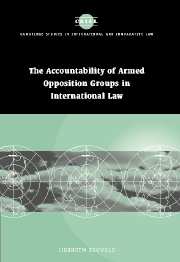Book contents
- Frontmatter
- Contents
- Table of treaties and declarations
- Table of cases
- Table of other documents
- List of abbreviations
- Introduction
- PART 1 THE NORMATIVE GAP
- PART 2 THE ACCOUNTABILITY GAP
- 3 Accountability of group leaders
- 4 Accountability of armed opposition groups as such
- 5 Accountability of the state for acts of armed opposition groups
- 6 The quest for accountability
- Conclusion
- Bibliography
- Index
- CAMBRIDGE STUDIES IN INTERNATIONAL AND COMPARATIVE LAW
3 - Accountability of group leaders
Published online by Cambridge University Press: 28 July 2009
- Frontmatter
- Contents
- Table of treaties and declarations
- Table of cases
- Table of other documents
- List of abbreviations
- Introduction
- PART 1 THE NORMATIVE GAP
- PART 2 THE ACCOUNTABILITY GAP
- 3 Accountability of group leaders
- 4 Accountability of armed opposition groups as such
- 5 Accountability of the state for acts of armed opposition groups
- 6 The quest for accountability
- Conclusion
- Bibliography
- Index
- CAMBRIDGE STUDIES IN INTERNATIONAL AND COMPARATIVE LAW
Summary
Part 1 identified the substantive law applicable to armed opposition groups. It appeared that restraints indeed exist, although the relevant law is still primitive. The next question to be addressed is: who can be held accountable for violating these norms or for failure to prevent or redress such violations? This chapter will deal with the lowest level of accountability: leaders of armed opposition groups. The next two chapters will examine the accountability of armed opposition groups as such, and of the territorial state.
The first and lowest level of accountability for acts of armed opposition groups holds that the military and civilian leadership of these groups can be held accountable. The role of leaders is decisive in order to ensure observance of international norms by armed opposition groups. Whether the norms are concerned with the military operations, places of internment or detention, superiors of armed opposition groups must supervise their proper application in order to avoid a fatal gap between the obligations of the armed opposition group and the conduct of its individual members. If the leaders permit or condone violations of international humanitarian law, this law is unlikely to have any effectiveness.
Accountability of leaders of armed opposition groups manifests itself in the form of the individual criminal responsibility of these persons. The responsibility of leaders of armed opposition groups must be distinguished from the responsibility of ordinary members of armed opposition groups.
- Type
- Chapter
- Information
- Publisher: Cambridge University PressPrint publication year: 2002

